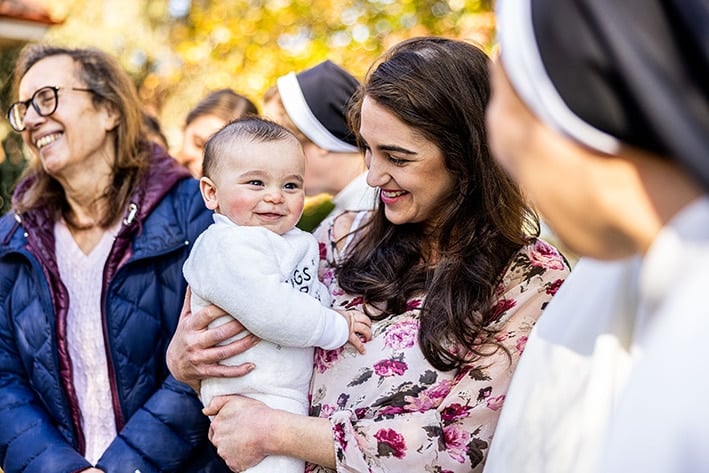
Like many mums this Sunday I will be lucky enough to have a fancy breakfast delivered to me in bed, made lovingly and laboriously by my kids (with help from their dad).
And after all that hard and hungry work, at least one of them is likely to wriggle carefully under the quilt so as not to spill my coffee and kindly point out that surely it’s too much to eat all by myself—and would I like a little help?
There are probably as many ways to think about motherhood, and as many kinds of mothers, as there are mums.
The 20th century Hungarian Cardinal József Mindszenty once wrote that the most important woman on Earth is a mother. I don’t know about that, but these often-quoted words still ring true to experiences I’ve had in some moments during pregnancy and labour:
“She has built something more magnificent than any cathedral—a dwelling for an immortal soul, the tiny perfection of her baby’s body. … Mothers are closer to God the creator than any other creature; God joins forces with mothers in performing this act of creation.”
I’m even more drawn to the philosopher-saint Teresa Benedicta of the Cross (Edith Stein), who wrote of the connection between biological and spiritual motherhood, and the potential for union with God as exemplified in Mary.
She also thought an impersonal and unjust world needed sympathy, concern and comfort:
“Everywhere the need exists for maternal sympathy and help … Only, the motherliness must be that which does not remain within the narrow circle of blood relations or of personal friends; but in accordance with the model of the Mother of Mercy, it must have its root in universal divine love for all who are there, belabored and burdened.”
Quirky but appealing is the medieval mystic Julian of Norwich’s envisioning of Jesus as mother, in enduring the pains on the cross which birthed us into the fullness of life, and who feeds us with his own body as a mother feeds her child with her own body.
“Jesus Christ … is our true mother. We received our being from him—and this is where his maternity starts—and with it comes the gentle protection and guard of love which will never cease to surround us,” the mystic wrote.
For introvert mums drawn to prayer in the middle of the overwhelming and intense season of having babies and caring for young children, as I have been, I took comfort in St Teresa of Avila’s characteristically passionate remonstration with her nuns who believed that to strive for the heights of contemplative prayer should be the be-all and end-all of their religious life.
“St Martha was a saint, even though they do not say she was contemplative. Well now, what more do you want than to be able to resemble this blessed woman who merited so often to have Christ our Lord in her home, give him food, serve him, and eat at table with him (and even from his plate)?”
Nevertheless, if I have ever experienced moments of deep, silent, wordless contemplation it has been in certain remembered moments with the children, while gazing on them swaddled and sleeping, or during middle of the night feeds with their brown eyes fixed on mine and little fingers curled in my hair.
This has been the gift, experiences you could say of ecstasy, of wordless intelligence, love in its simplest form that motherhood has given me, in a handful or less of special moments.
